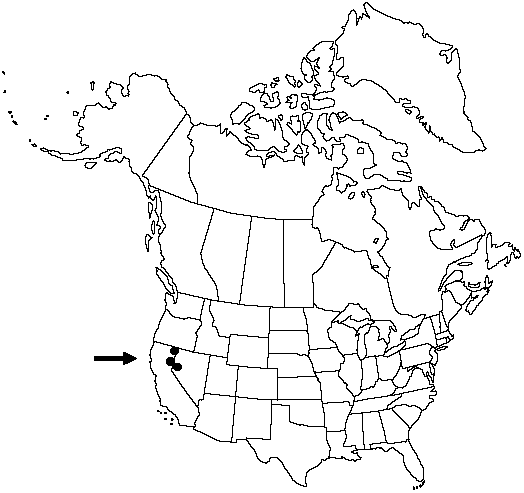Pinus washoensis
Madroño 8: 62. 1945.
Trees to 60m; trunk to 1m diam., straight; crown pyramidal. Bark yellow-brown to reddish, fissured, plates scaly. Branches spreading-ascending; twigs stout, orangish, aging gray, rough. Buds ovoid, red-brown, 1.5–2cm, not resinous; scale margins fringed. Leaves (2–)3 per fascicle, spreading-ascending, persisting (2–)4–6(–7) years, 10–15cm × ca. 1.5mm, slightly twisted, gray-green, all surfaces with stomatal lines, margins finely serrulate, apex acuminate; sheath 1–2cm, base persistent. Pollen cones cylindric, 10–20mm, red-purple. Seed cones maturing in 2 years, shedding seeds soon thereafter, not persistent, spreading, slightly asymmetric, ovoid-conic before opening, broadly ovoid when open, 7–10cm, tan or pale red-brown, sessile, abaxial surface of scales darker and sharply contrasting in color with adaxial surface; apophyses slightly raised, low pyramidal; umbo central, narrowly pyramidal, tapering into short, reflexed, fine prickle. Seeds ellipsoid; body ca. 0.8cm, gray-brown; wing to 16mm. 2n =24.
Habitat: Dry montane forests
Elevation: 2100–2500m
Distribution

Calif., Nev.
Discussion
Pinus washoensis often occurs in large stands and resembles P. jeffreyi. The number and posture of seed-cone scales fall within the ranges given for P. jeffreyi. The abaxial surface of these scales has a significantly darker pigmentation, however; such a color contrast is not apparent in P. jeffreyi. Forest geneticists have developed hybrids between P. washoensis and related yellow pines, but no natural hybrids have been observed. Some workers regard P. washoensis as closely related to—or even conspecific with--- P. ponderosa.
Of conservation concern.
Selected References
None.